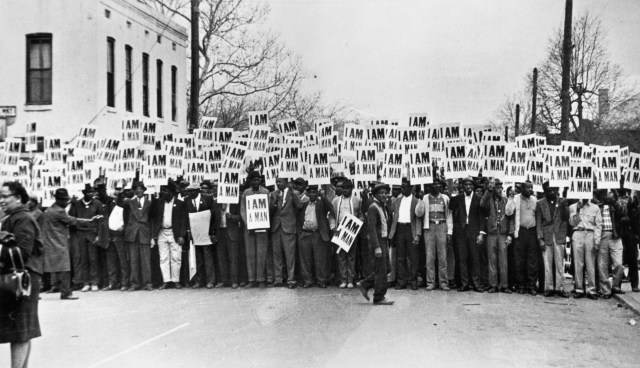It might be taking things too far to say that what’s happening in the US is the same as what’s happening internationally.
In the recent uprisings in Tunisia, Egypt, Algeria, Morocco, Yemen, Libya, Bahrain, Syria, and Jordan, people came together to demand freedom of voice, leadership they could believe in, and meaningful work. They wanted to be valued — and to create value.
So it might be too bold to say we’re experiencing a similar uprising in the US, in the form of the “Occupy Wall Street” protests. But maybe not. It is possible to work a full week at Wal-Mart, the world’s largest private employer, and the third largest US employer, and still not earn a living wage. With an average salary of $10.78/hour and starting pay far below that, families with children can easily be below the poverty line. The last time we had such issues was during the Civil Rights era when sanitation workers in Memphis could work a full week and still qualify for food stamps. Through the financial crisis in the later part of 2008, far too many people have lost their homes and their jobs, with the banking industry paying bonuses to the executives involved. Umair Haque describes what we are experiencing, as a “metamovement, an increasingly resonant reverberation of people challenging a brutal state of malfunction, challenging the Great Splintering of institutions and social contracts.” As Tom Friedman puts it, we’re not entirely clear what exactly “it is”, but something’s happening here.
Whatever is happening, there are economic and moral challenges involved. And it creates new challenges for businesses.
In their 2009 book, Wilkinson and Pickett of The Spirit Level argue that gross inequality tears at the human psyche, creating anxiety, distrust and a range of mental and physical ailments. They back up their argument with mountains of data. Most every measure of well being – from life expectancy to mental illness, violence to illiteracy – is affected less by how wealthy a society is on average, and more by its level of income inequality. Societies with a bigger gap between rich and poor are worse for everyone in them, including the well off. And America has the widest gap in income inequality of every developed country measured.
Inequality undermines the trust, solidarity, and mutuality. And yet these elements of trust, solidarity, mutuality are the core elements of what creates a culture of innovation. When anyone discounts the human stuff that enables people to create together, all the quantitative business stuff gets harder. Business performance goes up when engagement and collaboration go up.
Engagement and collaboration sit at odds with extreme inequality. When only a few titled leaders set direction and the rest of the talent are meant to simply execute, organizations end up with a culture in which people wait to be told what to do. Ultimately, this slows the company’s growth velocity and hurts every aspect of performance. (This is the subject of my first book). When we open up the spigot of an organization’s talent, and combine it with a culture that lets all people contribute to innovation, we can and will come up with endless ways to create a better prosperity. Some are calling this direction a human economy, which captures a certain truth.
Many question if this set of protests mean anything, or if anything will change. But there is an undercurrent worth listening to, of people seeking a shared narrative that will unite more than divide. Whatever you choose to call it, the point is this: together, we win. More often, and better. We no longer live in a world where a few create and rest do. We no longer live in a world where we are talked at, which shifts the responsibility so that we co-create what comes next together. In other words, we are all responsible for building what comes next. The question left is what will each of us do, in both big and small actions to spur on the revolution that ignites the human soul, fully alive in purpose and voice and with authority, at work. The CEO of Starbucks, Howard Schultz, has taken one step with his Create Jobs for USA campaign focused on small-business job growth. Every donor who contributes $5 or more will receive a bracelet inscribed with the word “Indivisible”. He is signaling an approach — that is up to each of us – not some governmental agency – to help each other through this. And I believe this approach is valid – only when we close the gap between an “us” and a “them”, will things change.
Human beings want to be valued. They want their voices to be heard. They want leadership they can believe in. They want to matter where they work, and they want purpose to guide their work. While the American situation looks quite different than the regions of Bahrain, Libya, or Egypt, these themes are the same. Create a shared purpose and a structure that enables people to be valued and to create value – then we’ll have meaningful work. And, meaningful economies.
(As is true for all my originally-written-for-HBR posts, please don’t make comments here. This allows me to respect the work my editor and I do to co-create together AND it helps enrich the conversation that takes place. Make them at their original posting spot. Thanks for helping with this.)





